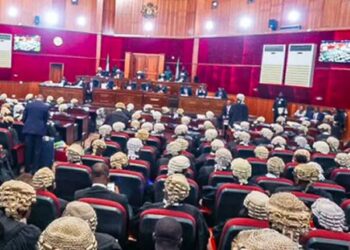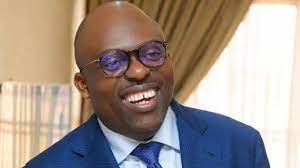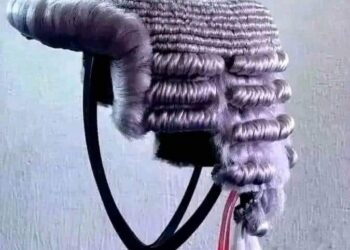Chief Justice of Nigeria, Justice Olukayode Ariwoola, has cautioned judges against allowing technicalities to impede the course of justice delivery.
He also said as an arbiter between parties, the judiciary has continued to live up to expectations in the discharge of its onerous responsibilities.
The CJN spoke Tuesday at the 5th Economic and Financial Crimes Commission (EFCC)/National Judicial Institute (NJI) Capacity Building Workshop for Justices and Judges in Abuja.
The CJN’s comment came at a time the various election petitions tribunal were delivering their judgements.
The rulings are being commended and slammed by parties in the suits/petitions, depending on where the pendulum swings.
Speaking at the workshop, Justice Ariwoola called on judges to be more proactive in resolving lingering cases of corruption across the courts.
He particularly called for more focus in dispensing justice without allowing legal technicalities to stand in the way of right adjudication of cases.
“Judges must be proactive by not allowing technicalities to stand against substantive justice,” he said.
The CJN, who commended the theme of the workshop, said it was coming at an appropriate as “it resonates deeply with the current state of our nation and the challenges of resolving lingering cases in our courts.”
Tinubu
Declaring the workshop open, President Bola Ahmed Tinubu commended the EFCC for making impressive gains in the fight against economic and financial crimes, and called for more vigorous and robust efforts at tackling the monster of corruption.
He said there were profound gains already made in the fight against corruption and that the EFCC played remarkable roles in achieving them.
He said: “For instance, available records show that EFCC has continued to achieve significant milestones in securing convictions and asset recovery running into billions of naira. There have also been significant improvements in the policy and legal frameworks for combating corruption with the National Anti-Corruption Strategy Plan and new legislations against money laundering, illicit financial flow and terrorism financing.”
The president noted the devastating effects of corruption against the nation’s growth and called for multi-sectoral and multifaceted approaches in tackling them.
Tinubu also said emphasis must be placed on synergy and inter-agency collaboration as potent weapons of attack against the monster.
“Corruption and related financial crimes have become a menace in our national life and have in consequence attracted poor perception index rating for Nigeria globally. It requires concerted collaborative efforts to effectively combat it”, he said.
While commending the efforts of “successive leadership of the EFCC and NJI” for sustaining the anti-graft war, the president charged judicial officers to be more passionate and courageous in carrying out their assignments to rid the nation of corrupt practices. “Without competent and courageous judges who are passionate about their country, progress in fighting corruption is impossible,” he said.
Tinubu, who spoke through the Attorney General of the Federation and Minister of Justice, Prince Lateef Fagbemi, SAN, applauded the theme of the workshop: “Consolidating on the Gains in the Fight against Economic and Financial Crimes.”
The president said: “My administration is determined to ensure that these gains are not reversed and that Nigeria achieves her dream of reducing corruption to the barest minimum. He assured that his agenda of fighting corruption is “not just a mantra but a call to duty by all agencies involved in combating the malaise.”
He specifically called for proper inter-agency synergy and collaboration while promising the “provision of adequate resources for the achievement of this noble objective and will therefore not accept any excuse for failure.”
The President expressed commitment to improving the efficiency of the administration of criminal justice system and make “comprehensive investments across the entire justice system in Nigeria to improve human resource capacity and create enabling working environment in view of rising backlogs of and attendant congestion of correctional centres.”
“He charged the NJI to take decisive steps in ensuring drastic improvement in the rating and perception of the nation’s judiciary. He also tasked the judiciary to be more proactive in the trial of awaiting inmates, arguing that “victims of all manner of crimes and their family must also be able to get justice within a reasonable time,” Fagbemi said.
EFCC
In his remarks, the acting EFCC chair, Mr. Abdulkarim Chukkol, emphasised the collaborative efforts of the EFCC and the NJI, stressing that “to effectively fight the menace of corruption and economic and financial crimes, the symbiotic relationship between the EFCC and the judiciary must be enhanced and encouraged.”
He noted that, though the challenges of fighting economic and financial crimes are daunting, “our dynamism and pro-activeness as a law enforcement agency has given us the advantage to be a step ahead of these criminals and continue to develop strategies to deal with them accordingly.”
The EFCC boss expressed confidence in the prospects of the workshop to deliver optimal benefits to every stakeholder, assuring that “this workshop will yield its desired purpose and communicate implementable solutions that will guide the EFCC in executing its new agenda in the fight against corruption and economic crimes.”
Other dignitaries at the opening ceremony of the three-day workshop include Chief Judges of some states, Justices of the Court of Appeal, and senior legal luminaries among others.




